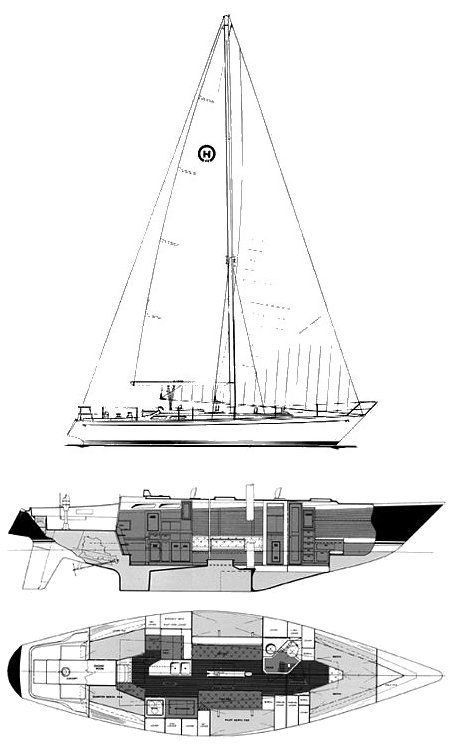The Hinckley 43 (Hood) is a classic American sailboat, renowned as a fast cruising vessel designed for both comfortable long-distance passages and competitive racing. Built by the prestigious Hinckley Yachts, known for its unwavering commitment to quality and innovative fiberglass construction, this model encapsulates the brand's enduring legacy in luxury yachting. Designed by the acclaimed naval architect Ted Hood, the Hinckley 43 combines elegant lines with robust construction, appealing to discerning sailors who prioritize both performance and exceptional craftsmanship.
Hinckley 43 (Hood) Information, Review, Specs

- Make
- Hood
- Model
- Hinckley 43
- Number Built
- Production Year(s)
- 1976 - 1981
The Hinckley 43 (Hood) was produced by Hinckley Yachts from 1976 to 1981, with a total of 18 hulls launched during this period. Initially introduced as the Hinckley Hood 43, the design was later commonly referred to as simply the Hinckley 43. There was also a "Hinckley 43 (Hood)-2" model, which incorporated slight design adjustments during its production run, starting in 1979.
Ted Hood, the prolific designer behind the vessel, conceived the Hinckley 43 as a capable fast cruising boat, well-suited for long-distance cruising and racing. His design philosophy often favored beamy keel/centerboard configurations, emphasizing offshore capabilities. This particular model features a fin keel with a centerboard, a hallmark of Hood's approach to versatile performance. During the late 1970s, Hinckley Yachts continued to uphold its reputation for pioneering fiberglass construction, a standard set with models like the Bermuda 40 in 1959. This commitment ensured the Hinckley 43 benefited from durable and strong hull construction, maintaining the builder's ethos of quality and longevity.
Sailing Performance and Handling
The Hinckley 43 (Hood) is characterized by its robust design and moderate performance capabilities. With a sail area to displacement ratio of approximately 16.38, she offers respectable performance in a variety of wind conditions, leaning towards a capable cruiser rather than an ultra-light air racer. Her ballast to displacement ratio, an impressive 0.45, indicates significant stability and stiffness, allowing her to stand up to heavy winds and maintain a comfortable motion in a seaway.
Further underscoring her solid, seaworthy nature, the displacement to length ratio of approximately 294.25 places her firmly in the category of a heavy, traditional cruiser. This robust build contributes to a stable and comfortable ride, particularly in challenging offshore conditions. A key feature influencing her handling and versatility is the keel/centerboard design. This configuration provides the shoal draft necessary for accessing shallow anchorages (approximately 4.33 feet with the board up), while the deployed centerboard (extending to 11.5 feet) enhances upwind performance and stability for fast ocean passages. The Hinckley 43 is generally regarded as a well-balanced and predictable boat, capable of handling long voyages with confidence.
Accommodations and Layout
Information regarding the specific interior layout of the Hinckley 43 (Hood) sailboat is not extensively detailed in readily available records. However, consistent with Hinckley's reputation for luxury and meticulous craftsmanship, one can infer a well-appointed and functional interior for a vessel of its size and era. Hinckley yachts are known for their high-quality finishes, typically featuring rich wood joinery, often teak, and durable, tasteful upholstery.
For a 42.83-foot masthead sloop designed for cruising, a typical layout would likely include a comfortable V-berth forward, a main salon with settees that convert into berths, a galley, and a navigation station. A head compartment would also be standard. Given Hinckley's commitment to owner comfort, storage would be ample, and ventilation systems (such as deck hatches and portlights) would be strategically placed. While specific headroom dimensions are not detailed, Hinckley generally designed their cruisers for comfortable living below deck, aiming for generous interior volume where possible.
Measurements
Construction & Hull
- Construction Material
- Fiberglass (Solid)
- Hull Type
- Monohull Sailboat
- Keel Type
- Centerboard
- Rudder
- 1x —
- Ballast
- 11500 lbs (Lead)
- Displacement
- 25500 lbs
- Water Capacity
- -
- Fuel Capacity
- -
Engine
- Engine Make
- Vire
- Engine Model
- W-40 FWC
- Engine Type
- —
- Engine HP
- 40
- Engine Count
- 1
- Drive Type
- —
- Fuel Type
- Diesel
Rig & Sails
- Rig Type
- Masthead Sloop
- P (Main Luff)
- 51.5 ft
- E (Main Foot)
- 13.8 ft
- I (Foretriangle Height)
- 58 ft
- J (Foretriangle Base)
- 18.3 ft
- Forestay Length (est)
- 60.82 ft
- Main Sail Area
- 355.35 sqft
- Foretriangle Sail Area
- 530.7 sqft
- Total Sail Area (Reported)
- 886 sqft
- Total Sail Area (Calc)
- 886.05 sqft
Dimensions
- LOA
- 42.83 ft
- LWL
- 33.83 ft
- Beam
- 12.33 ft
- Draft
- 11.5 ft
- Max Headroom
- -
- Air Draft
- -
Calculations
- Hull Speed
- 7.79 kn
- Pounds per Inch Immersion
- 1